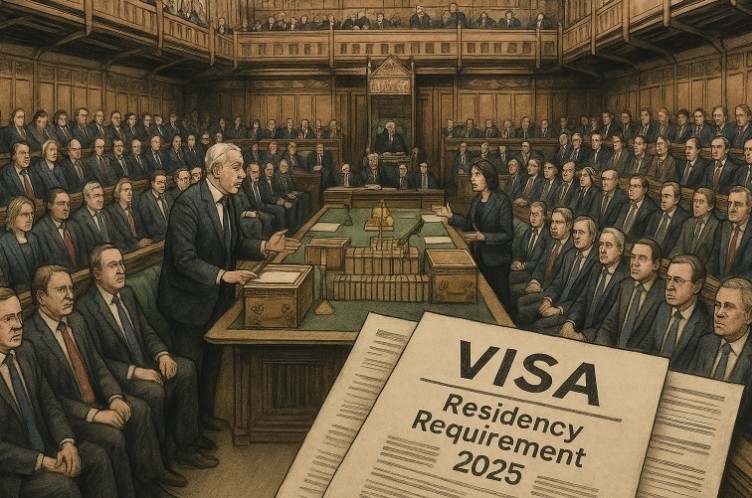The UK immigration system has entered a new phase of scrutiny and public interest as the government proposes significant changes to the skilled worker visa residency requirement.
Central to the debate is the planned extension of the qualifying period for Indefinite Leave to Remain (ILR) from five to ten years.
This shift, outlined in the 2025 Immigration White Paper, has sparked widespread concern among migrants, advocacy groups, and political figures alike.
With over 250,000 people signing two official petitions, the government is now facing increased pressure to reconsider the reforms.
As MPs prepare to debate the proposals in Westminster this September, the future of thousands of skilled workers in the UK hangs in the balance.
What is the UK Skilled Worker Visa and Why Is Residency So Important?
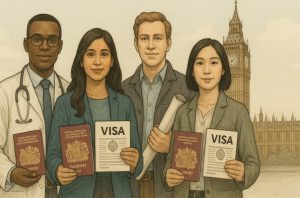
The UK Skilled Worker Visa is a key component of the country’s post-Brexit immigration system, introduced to attract global talent in sectors where domestic skills are in short supply.
It replaced the Tier 2 (General) visa in December 2020 and operates under a points-based framework.
The visa is available to foreign nationals who have secured a job offer from a UK employer that holds a sponsorship licence.
To be eligible, applicants must meet several criteria, including:
- A confirmed job offer in an eligible skilled occupation
- A minimum salary threshold (currently £26,200 per year or £10.75 per hour, though this varies by occupation and experience)
- Proficiency in English
- Certificate of sponsorship from a licensed UK employer
The Skilled Worker Visa grants the right to live and work in the UK for an initial period of up to five years, which can be extended. It also allows applicants to bring dependants (spouse and children) and access services such as healthcare through the Immigration Health Surcharge.
What sets this visa apart is that it provides a direct route to settlement, making it a popular choice among professionals looking to build long-term lives in the UK. After meeting the continuous residency requirement currently five years, visa holders may apply for Indefinite Leave to Remain (ILR), the UK’s version of permanent residence.
Residency, particularly the journey toward ILR, is fundamental for several reasons:
- Legal and Financial Security: Visa holders who reach ILR status are no longer subject to immigration controls. They are not required to renew visas or pay extension fees, which can accumulate to several thousand pounds over time. This security is critical for individuals planning careers, mortgages, education for children, and integration into British society.
- Employment Flexibility: While on a Skilled Worker Visa, individuals must work for their sponsoring employer. However, once ILR is granted, they can switch jobs freely, become self-employed, or even start their own business without needing sponsorship. This enhances their economic independence and professional mobility.
- Access to Public Funds and Services: Permanent residents gain access to public benefits and social security systems, which are restricted while on temporary visas. ILR also removes barriers to accessing higher education funding and other forms of state support, which is especially significant for families with children.
- Pathway to Citizenship: ILR is a crucial milestone toward British citizenship. After holding ILR for 12 months, individuals may apply to naturalise as British citizens, provided they meet the other requirements. Citizenship brings with it full rights, including the ability to vote and obtain a British passport.
- Family Stability and Long-Term Planning: For families, ILR provides peace of mind and allows for long-term decisions around education, property ownership, and community integration. Children born in the UK may be eligible for British citizenship if one parent obtains ILR, which has major implications for their future opportunities.
- Employer Confidence: From an employer’s perspective, workers on the path to ILR are often more stable, motivated, and likely to stay long-term. This reduces turnover, recruitment costs, and disruption in the workforce.
Despite its benefits, achieving ILR involves strict compliance with visa conditions, continuous residence, and absence limits from the UK. Applicants must also pass a Life in the UK test and meet character and financial requirements.
With the proposed reform to increase the qualifying period from five to ten years, the very essence of the Skilled Worker Visa as a pathway to stability is under review.
This has raised concerns among stakeholders about whether the UK will remain an attractive destination for global talent seeking secure and long-term opportunities.
Why Is the UK Government Proposing Changes to the Skilled Worker Visa Residency Requirement?
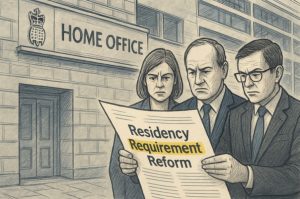
The proposed reform is part of the wider Immigration White Paper released in May 2025. The government’s intention is to revise the ILR eligibility timeline for Skilled Worker Visa holders, increasing it from five years to ten years.
This change aims to tighten immigration pathways and ensure that only individuals who show long-term commitment to the UK can obtain permanent residence.
The Home Office argues that this measure will align immigration policy with broader national goals, such as reducing net migration and prioritising integration.
The government has emphasised that many migrants seek permanent residence without contributing over a long enough period. By increasing the residency requirement, the government believes it will encourage only the most committed individuals to stay.
At the same time, critics argue that the policy could have unintended consequences. It may deter highly skilled workers from choosing the UK as a destination.
Additionally, it introduces uncertainty for current visa holders who had expected a shorter path to settlement.
How Are MPs Responding to the Skilled Worker Visa Residency Reforms?
The proposed changes have sparked intense political debate, prompting a scheduled discussion in the House of Commons on 8 September 2025.
The petitions that led to the debate gathered over 250,000 signatures combined, crossing the 100,000-signature threshold required for parliamentary review.
Reactions from MPs have varied across party lines. Some Conservative members support the reform as a necessary move to maintain control over immigration numbers and reinforce the integrity of the system.
They argue that long-term settlement should not be automatic and must reflect genuine integration into British society.
On the other side, opposition MPs from the Labour Party, the Liberal Democrats, and the Scottish National Party have raised concerns about the human and economic impact of the change.
They have highlighted how the policy could harm families and communities, especially those who have built their lives in the UK over the past few years.
Several MPs have also pointed out that the reform could damage the UK’s global image as a welcoming destination for talent and innovation.
What Are the Main Arguments Against the New Residency Requirement?
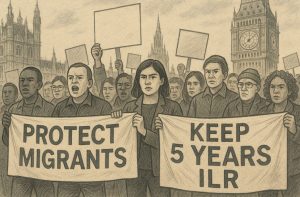
A significant portion of the public and various advocacy groups have voiced opposition to the proposed ILR extension. The most cited concern is that the change would affect individuals and families who moved to the UK based on the understanding that they could apply for permanent residency after five years.
Two major petitions reflect this concern. One gathered nearly 157,000 signatures calling for the five-year ILR route to remain in place for current visa holders.
Another petition, signed by over 107,000 people, focuses on the potential impact on British National Overseas (BNO) visa holders from Hong Kong.
Critics argue that the extension from five to ten years:
- Disrupts long-term planning for migrants already in the UK
- Increases financial strain due to ongoing visa renewal costs
- Prolongs uncertainty and dependency on sponsorship
- Undermines the UK’s moral commitments to BNO holders
Benedict Rogers, co-founder of Hong Kong Watch, has warned that the change could leave Hong Kongers vulnerable. He noted that many of them rely on ILR status for international travel and accessing higher education at domestic tuition rates. Without ILR, they face significant logistical and financial challenges.
How Could the Proposed Changes Affect Employers and the UK Labour Market?
UK businesses rely heavily on skilled migrant workers to meet the needs of a competitive and evolving economy. Sectors such as healthcare, IT, engineering, and logistics face ongoing labour shortages that cannot be filled through domestic recruitment alone.
The proposed ILR rule changes have raised concerns among employers and trade associations. Businesses fear that extending the settlement pathway will make the UK less appealing for top global talent, particularly when other countries offer more stable or shorter residency paths.
Key business concerns include:
- Increased recruitment costs due to staff turnover
- Reduced competitiveness in attracting overseas professionals
- Higher risk of talent moving to countries with more favourable immigration policies
A longer ILR timeline also affects employee morale. Many skilled workers look forward to settling down with greater security after five years. With the goalposts moved, they may reconsider long-term employment plans or choose to relocate elsewhere.
Who Are the Most Affected Groups Under the New ILR Rules?
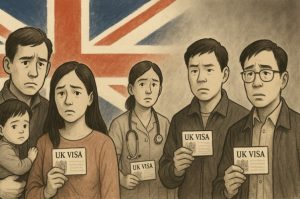
While the reform will apply broadly to skilled worker visa holders, specific groups are likely to experience disproportionate impact.
- Current Skilled Worker Visa Holders: Individuals who arrived in the UK with a clear understanding of a five-year ILR route now face uncertainty. Many are mid-way through their journey and have already made personal and professional commitments based on the existing policy.
- British National Overseas (BNO) Visa Holders: The UK government extended a special immigration route to BNO passport holders from Hong Kong after the introduction of China’s national security law. These individuals have placed significant trust in the UK’s promises. Extending the ILR period would complicate their plans and may even endanger their ability to maintain legal status in both jurisdictions.
- Families and Children of Migrants: Families are particularly affected by long-term uncertainty. Children born in the UK to skilled migrants may still not be eligible for British citizenship until their parents secure ILR. Delaying this process affects schooling, benefits eligibility, and access to healthcare.
What Are the Alternatives Being Suggested by Campaigners and MPs?
Several groups have put forward alternatives that aim to balance the government’s objectives with the rights and wellbeing of migrants.
Grandfathering Existing Visa Holders
One of the most common proposals is to allow current skilled worker visa holders to apply for ILR after five years, preserving the original terms under which they migrated. This approach would maintain trust in the UK’s immigration system and prevent retroactive hardship.
Exemptions for Key Sectors
MPs and business groups have suggested that certain high-demand occupations be exempted from the 10-year ILR rule. For example, healthcare professionals, social care workers, and teachers may qualify under a shorter timeline.
Special Consideration for BNO Holders
Given the geopolitical context, campaigners argue that BNO visa holders should not be subject to extended settlement requirements. The UK has a unique moral and legal responsibility to uphold its commitments to this group.
What Happens Next in the UK Visa Residency Requirement Debate?

With both petitions surpassing the necessary signature threshold, the government has scheduled a parliamentary debate for 8 September 2025. This will provide MPs with the opportunity to formally discuss the policy and consider amendments or alternative approaches.
The outcome of the debate is not guaranteed. The government may decide to press forward with the policy, introduce a revised version with exemptions, or abandon the proposal altogether. Much will depend on public response, media coverage, and pressure from key industries and advocacy groups.
In the meantime, migrants, employers, and legal experts are closely monitoring developments. The decisions made in Parliament will have long-term implications for the UK’s immigration framework and its ability to attract and retain skilled workers.
Current vs Proposed Skilled Worker Visa Residency Rules
| Residency Policy Element | Current Rule | Proposed Rule (2025) |
| ILR Qualification Period | 5 years | 10 years |
| Affected Visa Types | Skilled Worker Visa | Skilled Worker and BNO Visas |
| Retroactive Application | Not Applicable | Under Discussion |
| Estimated Visa Renewal Costs | £2,400 over 5 years | £5,000+ over 10 years |
| Sponsorship Requirement | Until ILR | Extended by 5 more years |
Key Groups Impacted by the 2025 ILR Reforms
| Group Affected | Potential Challenges |
| Skilled Worker Visa Holders | Delayed settlement, uncertainty, increased visa costs |
| BNO Visa Holders | Financial instability, international travel complications |
| Employers | Talent shortages, recruitment challenges |
| Families of Migrants | Schooling, benefits eligibility, longer legal limbo |
| UK Economy | Lower attractiveness to global talent |
FAQs
What is Indefinite Leave to Remain and how does it affect skilled workers in the UK?
Indefinite Leave to Remain (ILR) is a form of permanent residency that allows foreign nationals to live and work in the UK without time restrictions. For skilled workers, achieving ILR is often the final step toward citizenship and full integration.
Can current Skilled Worker Visa holders still apply under the 5-year ILR rule?
As of August 2025, current visa holders are still eligible for ILR after five years. However, if the new policy passes, it may apply retroactively or to new applicants only. The government has yet to clarify this point.
How does this change affect families of skilled workers?
Longer ILR timelines could delay access to public services and financial support for dependents. It may also impact decisions related to education, home ownership, and healthcare access.
Why are BNO passport holders particularly impacted by the ILR change?
BNO holders from Hong Kong were given a special immigration route following the 2020 national security law. Extending their ILR timeline could hinder their international travel, education options, and financial planning.
Are any other countries considering similar immigration policies?
Some nations are tightening immigration, but many like Canada, Australia, and Germany, are shortening or streamlining pathways to permanent residency to attract global talent.
What sectors are most reliant on skilled migrant workers in the UK?
The NHS, tech, logistics, education, and finance sectors are among the most reliant. Many roles in these industries are difficult to fill domestically, making immigration essential.
Could these visa changes affect the UK’s ability to attract talent globally?
Yes. If the UK becomes perceived as less welcoming or stable for migrants, international workers may choose countries with more transparent and quicker residency pathways.

